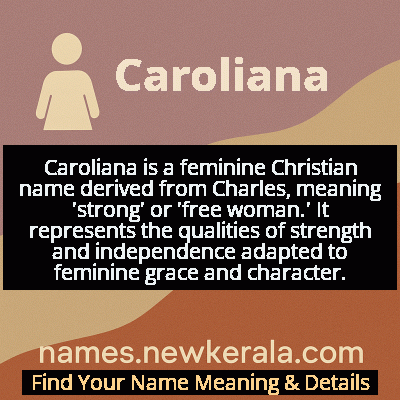Caroliana Name Meaning & Details
Origin, Popularity, Numerology Analysis & Name Meaning of Caroliana
Discover the origin, meaning, and cultural significance of the name CAROLIANA. Delve into its historical roots and explore the lasting impact it has had on communities and traditions.
Name
Caroliana
Gender
Female
Origin
Christian
Lucky Number
2
Meaning of the Name - Caroliana
Caroliana is a feminine Christian name derived from Charles, meaning 'strong' or 'free woman.' It represents the qualities of strength and independence adapted to feminine grace and character.
Caroliana - Complete Numerology Analysis
Your Numerology Number
Based on Pythagorean Numerology System
Ruling Planet
Moon
Positive Nature
Diplomatic, friendly, artistic, empathetic.
Negative Traits
Over-sensitive, moody, indecisive, prone to self-pity.
Lucky Colours
Green, cream, white.
Lucky Days
Monday.
Lucky Stones
Pearl, moonstone.
Harmony Numbers
1, 3, 4.
Best Suited Professions
Diplomats, mediators, caregivers, artists.
What People Like About You
Cooperative spirit, friendliness, artistic talent.
Famous People Named Caroliana
Carolina Herrera
Fashion Designer
Founded global fashion house and became influential designer
Carolina Marin
Badminton Player
Olympic gold medalist and three-time World Champion
Carolina Crescentini
Actress
Award-winning Italian actress in major films
Carolina Klüft
Athlete
Olympic gold medalist and three-time World Champion in heptathlon
Name Variations & International Equivalents
Click on blue names to explore their detailed meanings. Gray names with will be available soon.
Cultural & Historical Significance
In Latin American cultures, Carolina became particularly popular due to Spanish and Portuguese colonial influence, often given to honor religious figures, family traditions, or geographical connections to places like the Carolinas in the United States. The name embodies a blend of feminine grace with the strength and leadership qualities traditionally associated with masculine names, making it a popular choice for parents seeking a name that balances traditional Christian values with modern independence. Its usage across different Christian denominations and cultural contexts demonstrates its universal appeal while maintaining its core identity as a name representing strength, faith, and nobility of character.
Extended Personality Analysis
Women named Caroliana are typically perceived as possessing a unique blend of strength and grace, reflecting the name's meaning of 'manly' or 'strong' in a feminine context. They often exhibit natural leadership qualities, confidence, and determination, combined with warmth and emotional intelligence that makes them effective in both professional and personal settings. Carolianas are frequently described as resilient individuals who can handle challenges with poise and maintain their composure under pressure, drawing on an inner strength that others find inspiring.
Their strong character is typically balanced by a nurturing side, making them excellent caregivers, community leaders, and reliable friends. Many Carolianas display creative talents and artistic sensibilities, often excelling in fields that require both analytical thinking and emotional depth. They tend to be loyal in relationships, valuing deep connections and maintaining long-term bonds with family and friends. The name suggests someone who is both grounded and ambitious, capable of achieving significant personal and professional success while maintaining strong moral principles and community ties. This combination of strength and compassion makes Carolianas natural leaders who lead by example rather than authority.
Modern Usage & Popularity
In contemporary naming practices, Caroliana maintains its status as a sophisticated and timeless choice, though it's less common than its shorter variant Carolina. The name enjoys moderate popularity in Latin American countries, Southern Europe, and among families with Christian traditions who appreciate its historical and religious significance. While it rarely appears in top baby name charts in English-speaking countries, it maintains a steady presence as an elegant alternative to more popular feminine names. Modern parents often choose Caroliana for its classic sound and the strength it conveys, appealing to those who want a traditional name with character that stands out from more common choices. The name has seen some resurgence in recent years as vintage names return to fashion, particularly among parents seeking names that honor family heritage while offering a distinctive flair. Its usage spans various socioeconomic backgrounds and continues to be associated with grace, intelligence, and strong character across different cultures.
Symbolic & Spiritual Meanings
Symbolically, Caroliana represents the harmonious balance between strength and femininity, embodying the concept that true power includes compassion, grace, and emotional intelligence. The name carries deep connotations of freedom and independence, reflecting its etymological roots meaning 'free man' or 'free person' while adapting these qualities to feminine expression in modern contexts. It symbolizes resilience and the ability to overcome challenges with dignity and poise, much like the historical figures, saints, and queens associated with variations of the name throughout Christian history. In spiritual symbolism, Caroliana connects to the idea of faithful strength and moral courage, representing someone who stands firm in their beliefs and values while showing mercy, understanding, and compassion to others. The name also carries royal and noble symbolism, evoking images of dignified leadership, responsibility, and the grace that comes with true authority. It suggests a person who can both lead decisively and nurture gently, command respect while showing empathy, and honor tradition while embracing positive change and progress.

